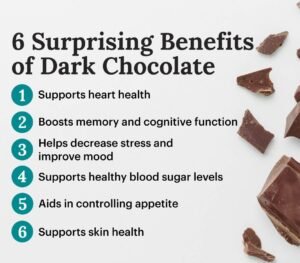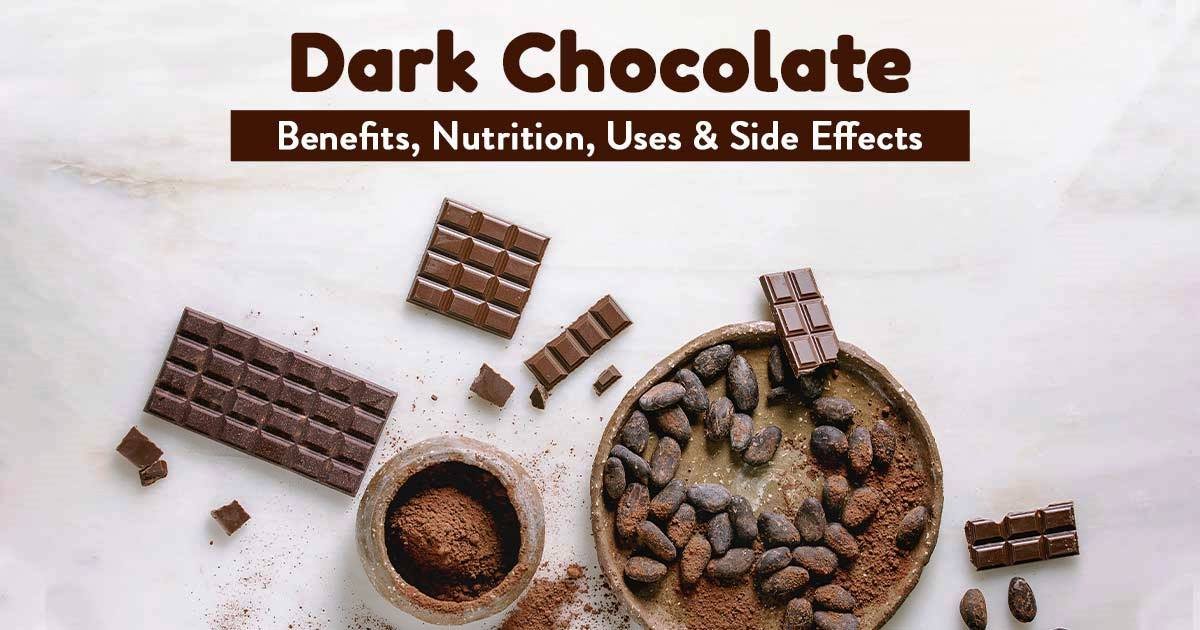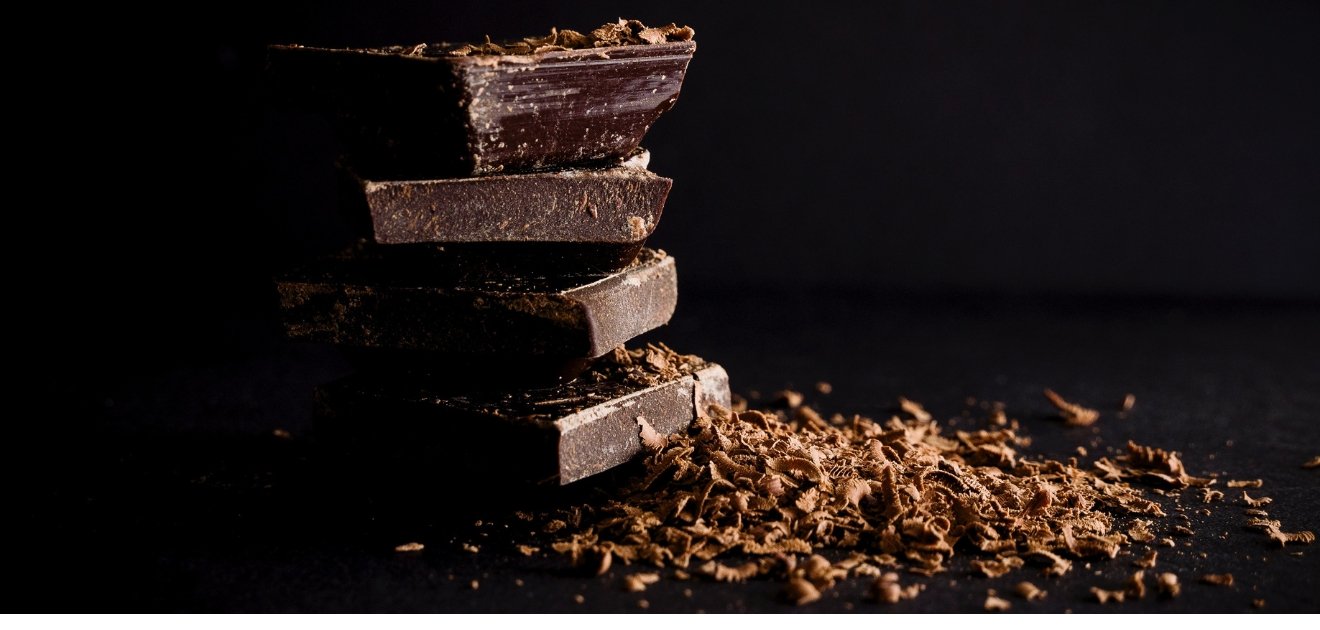
Dark Chocolate Introduction
Dark Chocolate In the realm of indulgent treats, one stands out not only for its rich flavor but also for its potential health benefits – dark chocolate. Beyond its delectable taste, dark chocolate boasts a fascinating history, a plethora of health benefits, and surprisingly, a role in aiding weight loss. Let’s delve deeper into the world of dark chocolate, from its origins to its modern-day applications in promoting wellness.
A Brief History
The story of dark chocolate begins in ancient Mesoamerica, where the Mayans and Aztecs revered cacao as a divine gift. They consumed it in the form of a bitter, frothy beverage, often flavored with spices or chili peppers. Cacao beans held immense cultural and economic significance, serving as currency and even featuring in religious ceremonies. When the Spanish conquistadors encountered cacao during their expeditions in the 16th century, they introduced it to Europe. Initially reserved for aristocrats and royalty, chocolate underwent transformations with the addition of sugar, making it more palatable to European tastes. By the 19th century, advancements in chocolate production led to the creation of the first solid chocolate bars, laying the foundation for the modern chocolate industry.
The Evolution of Dark Chocolate
Dark chocolate, distinguished by its high cocoa content and minimal sugar, emerged as a sophisticated delicacy in contrast to its sweeter counterparts. Its intense flavor profile, ranging from fruity to earthy notes, appealed to discerning palates. Moreover, scientific research began uncovering the health benefits associated with dark chocolate, sparking a surge in its popularity among health-conscious consumers.

Health Benefits of Dark Chocolate
Dark chocolate isn’t just a guilty pleasure; it’s a nutritional powerhouse loaded with antioxidants, minerals, and other bioactive compounds. Here are some of the key health benefits associated with consuming dark chocolate in moderation:
Rich in Antioxidants
Dark chocolate contains flavonoids, potent antioxidants that help neutralize free radicals and reduce oxidative stress, thereby lowering the risk of chronic diseases such as heart disease and cancer.
Heart Health
Regular consumption of dark chocolate has been linked to improvements in cardiovascular health, including reduced blood pressure, improved blood flow, and lower cholesterol levels. These benefits are attributed to the flavonoids and other bioactive compounds present in cocoa.
Brain Function
Flavanols found in dark chocolate may enhance cognitive function by improving blood flow to the brain, which in turn could support memory, attention, and overall cognitive performance.
Mood Enhancement
Dark chocolate contains serotonin precursors and other compounds that promote the release of endorphins, neurotransmitters associated with feelings of happiness and well-being. As a result, indulging in a small serving of dark chocolate can uplift mood and alleviate stress.
Skin Health
The flavonoids in dark chocolate may help protect the skin against UV damage, improve hydration, and promote collagen production, contributing to a healthier, more youthful complexion.
Utilizing Dark Chocolate for Weight Loss
Contrary to popular belief, dark chocolate can be incorporated into a weight loss regimen when consumed mindfully and in moderation. Here’s how dark chocolate can aid in weight loss:
Satiety
Despite its rich flavor, dark chocolate tends to be more satiating than milk or white chocolate due to its higher cocoa content and fiber content. Consuming a small piece of dark chocolate as a snack can help curb cravings and prevent overeating later in the day.
Metabolism Boost
Some studies suggest that the compounds found in dark chocolate, such as catechins and caffeine, may slightly increase metabolic rate, promoting calorie burning. However, it’s important to note that the effect is modest and should not be relied upon as a sole strategy for weight loss.
Stress Reduction
Stress and emotional eating are common barriers to weight loss. Dark chocolate, with its mood-enhancing properties, can help alleviate stress and reduce the likelihood of turning to unhealthy comfort foods for solace.
Mindful Eating
Incorporating dark chocolate into a balanced diet encourages mindfulness, fostering a healthy relationship with food. By savoring each bite mindfully, individuals can better regulate their food intake and make conscious choices that support their weight loss goals.
Conclusion
Dark chocolate isn’t just a delectable indulgence; it’s a treasure trove of health-promoting compounds that have been celebrated for centuries. From its ancient origins in Mesoamerica to its modern-day status as a superfood, dark chocolate continues to captivate taste buds and inspire curiosity. When enjoyed in moderation as part of a balanced diet, dark chocolate can offer a myriad of benefits, including support for heart health, cognitive function, mood, and even weight loss. So go ahead, savor a square of dark chocolate guilt-free, knowing that you’re treating yourself to both pleasure and wellness.
What is dark chocolate?
Dark chocolate is a type of chocolate that contains a high percentage of cocoa solids and little to no added sugar. It typically has a rich, intense flavor and a slightly bitter taste compared to milk or white chocolate.
What is the difference between dark chocolate and other types of chocolate?
The main difference lies in the cocoa content and the amount of sugar added. Dark chocolate has a higher cocoa content, usually ranging from 50% to 90% or more, whereas milk chocolate contains less cocoa and more sugar. White chocolate, on the other hand, contains cocoa butter but no cocoa solids.
Is dark chocolate healthy?
Dark chocolate can be part of a healthy diet when consumed in moderation. It contains antioxidants, minerals such as magnesium and iron, and other beneficial compounds like flavonoids, which have been associated with various health benefits including improved heart health, cognitive function, and mood.
What are the health benefits of dark chocolate?
Some of the potential health benefits of dark chocolate include: Improved heart health Dark chocolate may help lower blood pressure, reduce inflammation, and improve cholesterol levels.
Enhanced brain function: The flavonoids in dark chocolate may support cognitive function and protect against age-related cognitive decline.
Mood enhancement: Dark chocolate contains compounds that can stimulate the release of endorphins and serotonin, promoting feelings of happiness and well-being.
Antioxidant properties: The antioxidants in dark chocolate may help protect cells from damage caused by free radicals, potentially reducing the risk of chronic diseases.
Can dark chocolate help with weight loss?
While dark chocolate is more nutrient-dense and less sugary than other types of chocolate, it should be consumed in moderation as part of a balanced diet. Some studies suggest that the compounds in dark chocolate, such as catechins and caffeine, may slightly boost metabolism and promote satiety, which could support weight loss efforts. However, relying solely on dark chocolate for weight loss is not advisable.
How much dark chocolate should I eat per day?
There is no one-size-fits-all answer to this question, as individual dietary needs and preferences vary. It’s generally recommended to consume dark chocolate in moderation, aiming for small servings (around 1-2 ounces) a few times per week. Opt for dark chocolate with a higher cocoa content and minimal added sugar for maximum health benefits.
Are there any risks associated with eating dark chocolate?
While dark chocolate is generally considered safe for most people when consumed in moderation, excessive intake can contribute to weight gain and other health issues due to its calorie and fat content. Some individuals may also be sensitive to caffeine or theobromine, two stimulants found in chocolate, and may experience side effects such as jitteriness or insomnia.
Is all dark chocolate vegan?
Not necessarily. While dark chocolate itself is often vegan-friendly, some brands may include ingredients such as milk fat or milk solids, which would make them unsuitable for vegans. It’s essential to check the ingredients list to ensure that the dark chocolate you choose is free from animal products if you follow a vegan diet.
How should I store dark chocolate?
Dark chocolate should be stored in a cool, dry place away from direct sunlight and strong odors. It’s best to keep it tightly wrapped or sealed to prevent moisture and air exposure, which can cause the chocolate to develop a whitish film known as “bloom.” Properly stored, dark chocolate can last for several months to a year.
Can dark chocolate cause allergies?
While cocoa itself is not a common allergen, some individuals may be allergic to other ingredients found in dark chocolate, such as milk, nuts, or soy lecithin. If you have known food allergies or sensitivities, it’s essential to read the ingredients list carefully and choose dark chocolate that is free from allergens that you need to avoid.
Disclaimer:
The information provided on this blog is intended for general informational purposes only and should not be construed as medical advice, diagnosis, or treatment. Always seek the advice of your physician or other qualified health provider with any questions you may have regarding a medical condition or dietary regimen.
For more information visit: Coffee Health Benefits




